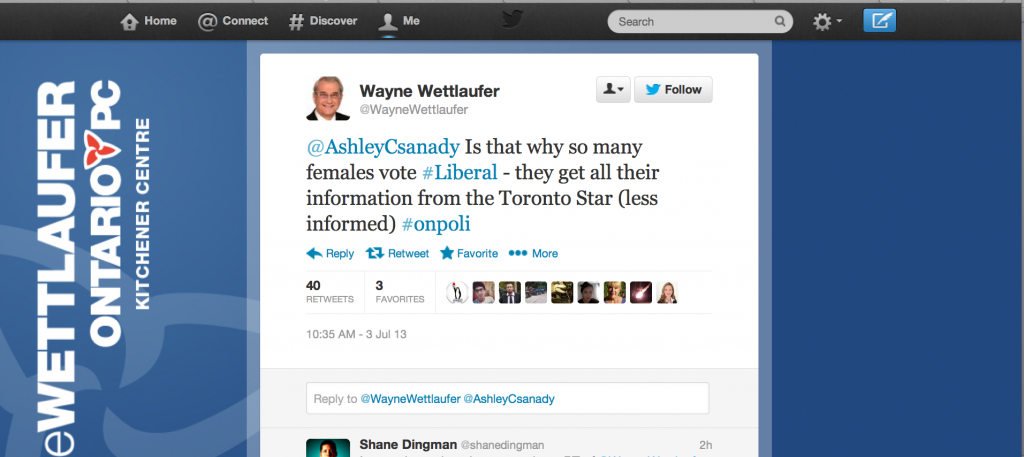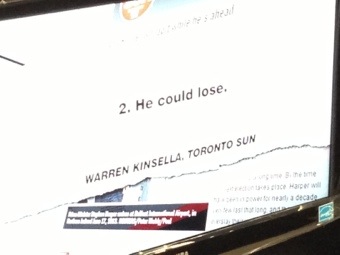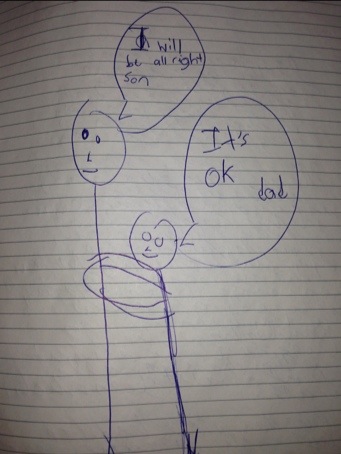Byline, July 3: ten reasons why Harper may quit, discussed
The New York Post’s Egyptian haiku
But smoking crack out on Dixon Road? That’s something we support, dude!
Ontario PC deep thinker kicks off by-elections
A tale of five by-elections, plus free bonus highly-scientific poll!
Who’s gonna win the most? Who’s gonna lose the most? Personally, I think by-elections rarely end well for governments, so the Wynne people need to lower expectations, in the way that Hudak and Horwath are busily doing.
Wynne’s assets? She exceeds expectations, and she can rely on a horde of government staffers to work those ridings during the political black hole of Summertime. Horwath? She’s still the most popular politician in the province, and she’s got this smart guy named Ramiro Mora helping her out. Hudak? He’s got Leslie Noble and Tom Long behind the scenes – and Noble and Long are two of the most strategic people in Canadian politics.
I don’t know most of the candidates in the by-elections – but I encourage the good people of Ottawa South to cast a ballot for my friend John Fraser, who is one of the hardest-working constituency people I’ve ever met. Decent guy and pretty smart, too.
How do you think the August 1 by-elections will end up? Vote now, vote often!
The big reason why Harper may just quit
My take on why Teenage Head were godlike geniuses, as done for CBC
In today’s Sun: ten reasons why Harper may quit
It’s (finally) summertime, when the political speculation is easy.
Heretofore, the subject that no longer seems as crazy as it once did: Will Stephen Harper quit before the next federal election in October 2015?
There are plenty of reasons why he shouldn’t, or why he won’t.
But there are 10 very good reasons why he just might, too. Here they be:
1. Ten years is a long time: By the time the next election takes place, Harper will have been in power for nearly a decade. Very few last that long, and those who overstay their welcome inevitably end up regretting their decision. After that much time has gone by, voters start to get sick of your face.
2. He could lose. As pollsters have been saying for months, Liberal Leader Justin Trudeau is the real deal. By now, it is clear that his popularity is no passing fad. For the first time, Harper needs to consider the possibility that he could to lose to someone he clearly considers his inferior. He doesn’t want to do that.
3. His party is getting restless. As Alberta Wildrose supporter Rod Love once observed: “When the water dries up, the animals begin to look at each other differently.” So too in politics. Harper’s backbench is no longer afraid of him, and rebelling. His PMO is heartily detested throughout the Conservative hinterland. To many Conservatives, Harper is being quietly regarded as a liability, and not an asset.
4. Leadership shenanigans abound: Jason Kenney has been running a leadership campaign for months; Peter MacKay is warning he will quit the party if he doesn’t get his way on leadership selection rules. Harper, mindful of what Jean Chretien endured, may be persuaded to choose discretion over valour.
5. He is not a wealthy man: Harper and his wife own their Calgary home, but not much else. And, as Calgary Conservative legend Harvie Andre once queried: “Why is it more profitable to know Harvie Andre than to be Harvie Andre?” Harper, knowing this, may decide he needs to build up a retirement nest egg while he still can.
6. He’s a young man: Not even 60, Harper has many prime earning years ahead of him — as a corporate rainmaker, as a member of lucrative boards, as the giver of big-ticket speeches. Why wait until he can’t enjoy the fruits of his labours? Why not go while the getting’s good?
7. Everything starts to look the same: After 10 years in the same job, new files aren’t as exciting or as challenging as they once were. Things develop a sameness to them; boredom and sloppiness start to set in. When that happens, it’s time to go.
8. The Cons don’t stand for anything anymore: Even the party faithful are admitting the mission statement is long forgotten. They have become, in effect, what they came to Ottawa to destroy. Even Harper, a policy wonk and partisan, would be hard pressed to express his party’s raison d’etre. Canadians sure can’t.
9. The job is done: Harper wanted to do three things. One, reduce the Liberal Party to a shadow of its former self. Two, unite conservatives as a single political force. Three, make conservativism a less radical political choice. He has indisputably done all three. His legacy is achieved.
10. Him: Watch him. Listen to him. There is no joy in the job for him anymore. There is no challenge. He looks unhappy.
Will he go?
Who knows?
But no one should be surprised, now, if he does.





